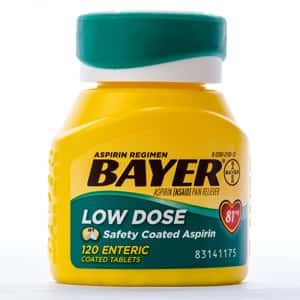
Patients don’t always get clear instructions about how to stop medicines. That is especially true when it comes to over-the-counter drugs. Discontinuing PPIs (proton pump inhibitors like esomeprazole (Nexium), lansoprazole (Prevacid) or omeprazole (Prilosec) too fast might lead to rebound heartburn symptoms. Unpleasant, but not life threatening. New research suggests that it might not be a good idea to stop aspirin too fast. The consequences could be life threatening.
A Reader Shares a Sad Stop Aspirin Story:
Q. This is a true story. In the 1950s, my grandmother was taking a “heart pill” her doctor had prescribed. The older doctor retired and Granny went to see the new doctor to get her heart pill refilled. The young doctor told her, “Mrs. G., this is nothing but aspirin. There is nothing wrong with your heart.”
He refused to refill her heart pill. Three weeks later she died of a heart attack. That was in the 1950s before any research had been done on the effects of aspirin and the heart.
The Swedes Say: Stop Aspirin At Your Peril:
A. It took decades for the medical profession to recognize how useful aspirin could be in preventing heart attacks. A recent Swedish study discovered that people who discontinued low-dose aspirin were 37 percent more likely to have a hospitalization, heart attack or stroke (Circulation, online, Sept. 26, 2017).
Here is Clinical Perspective from The Swedish researchers:
What Is New?
- “Discontinuing long-term low-dose aspirin treatment in the absence of major surgery or bleeding may be hazardous.
- “We investigated that question among 601 527 users of low-dose aspirin for primary or secondary prevention identified in the Swedish drug prescription register.
- “Patients who discontinued aspirin had a 37% higher rate of cardiovascular events than those who continued, corresponding to an additional cardiovascular event observed per year in 1 of every 74 patients who discontinue aspirin.
- “The risk increased shortly after discontinuation and did not appear to diminish over time.
What Are the Clinical Implications?
- “Adherence to low-dose aspirin treatment in the absence of major surgery or bleeding is likely an important treatment goal.
- “Millions of patients worldwide take aspirin on a daily basis and might consider stopping at some time during their lives.
- “This article may help physicians and patients to make an informed decision on whether to stop aspirin use.”
Why Would It Be Dangerous to Stop Aspirin Suddenly?
The investigators suggest that there may be rebound blood clotting when aspirin is discontinued suddenly. Other research has also shown a link between aspirin discontinuation and serious cardiovascular events (BMJ, July 19, 2011; Neurology, Feb. 22, 2011; Archives of Neurology, Aug. 2005; Journal of Internal Medicine, May, 2005).
People’s Pharmacy Perspective:
If you are told to stop aspirin prior to surgery or before any medical procedure, make sure your physician is aware of your cardiovascular risk profile. Get clear instructions about how to taper off aspirin and for how long. If you are experiencing side effects from aspirin, check with the prescriber to find out how to stop aspirin safely.

